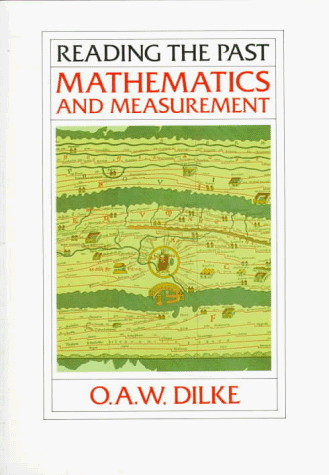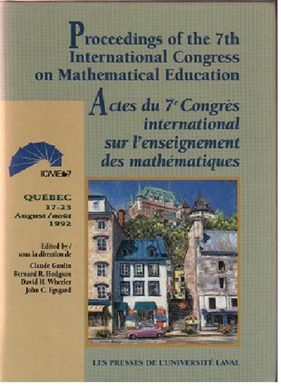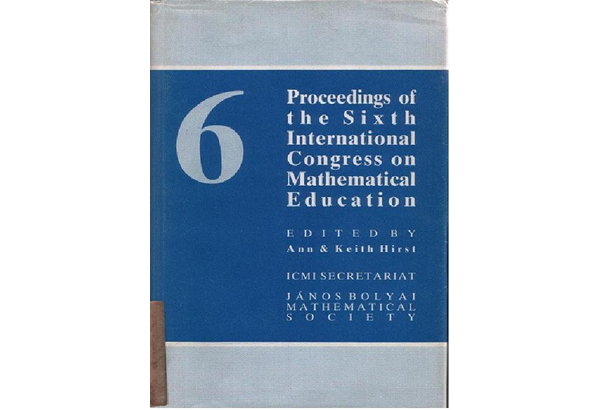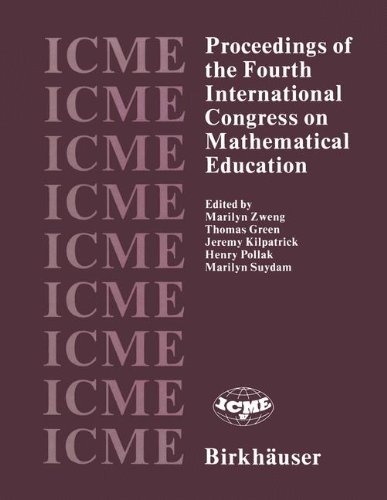ICME-7 1992 Québec (Canada)
Claude Gaulin, Bernard R. Hodgson, David H. Wheeler, John C. Egsgard
Les Presses de l'Universite Laval | 1994 | 529 páginas | pdf (OCR) |33,4 Mb
link
pdf - 496,6 Mb (no OCR)
link direto: mathematik.uni-bielefeld.de
djvu - 50,7 Mb (OCR)
link direto: mathematik.uni-bielefeld.de
Contents
Preface p. XIII
Codes of countries p. XXI
Schedule p. XXIV
PRESIDENTIAL ADDRESS1
Plenary Lectures
Teachers of Mathematics - Geoffrey Howson p. 9
Bringing Mathematical Research to Life in the Schools - Maria M. Klawe p. 27
Enseigner la géométrie: permanences et révolutions - Colette Laborde p. 47
Fractals, the Computer, and Mathematics Education - Benoit B. Mandelbrot p. 77
Working Groups
WG 1: La formation de concepts mathématiques élémentaires au primaire (Helen Mansfield, AUS) p. 101
WG 2: Students' Misconceptions and Inconsistencies of Thought (Shlomo Vinner, ISR) p. 109
WG 3: Students' Difficulties in Calculus (Michèle Artigue, FRA) p. 114
WG 4: Theories of Learning Mathematics (Pearla Nesher, ISR) p. 120
WG 5: Improving Students' Attitudes and Motivation (Gilah Leder, AUS) p. 128
WG 6: Preservice and Inservice Teacher Education (John Dossey, USA) p. 134
WG 7: Language and Communication in the Mathematics Classroom (Heinz Steinbring)
WG 8: Innovative Assessment of Students in the Mathematics (Jùlianna Szendrei, HUN)
WG 9: [Not listed]
WG 10: Multicultural and Multilingual Classrooms (Patrick Scott, USA) p. 154
WG 11: The Role of Geometry in General Education (Rina Hershkowitz, ISR) p. 160
WG 12: Probability and Statistics for the Future Citizen (Mary Rouncefield, GBR) p. 168
WG 13: The Place of Algebra in Secondary and Tertiary Education (Carolyn Kieran, CAN)
WG 14: Mathematical Modelling in the Classroom (Trygve Breitag, NOR) p. 180
WG 15: Undergraduate Mathematics for Different Groups of Students (Daniel Alibert, FRA)
WG 16: The Impact of the Calculator on the Elementary School (Hilary Shuard †, GBR)
WG 17: Technology in the Service of the Mathematics Curriculum (Klaus-D. Graf, GER)
WG 18: Methods of Implementing Curriculum Change (Hugh Burkhard, GBR) p. 202
WG 19: Early School Leavers (Carlos Vasco, COL) p. 205
WG 20: Mathematics in Distance Learning (Gordon Knight, NZL) p. 211
WG 21: The Public Image of Mathematics and Mathematicians (Thomas Cooney, USA)
WG 22: Mathematics Education with Reduced Resources (Elfriede Wenzelburger †, MEX)
WG 23: Methodologies in Research in Mathematics Education (Norbert Knoche, GER)
Topic Groups
TG 1: Mathematical Competitions (Edward J. Barbeau) p. 239
TG 2: Ethnomathematics and Mathematics Education (Ubiratan D'Ambrosio, BRA) p. 242
TG 3: Mathematics for Work: Vocational Education (Rudolf Straesser, GER) p. 244
TG 4: Indigenous Peoples and Mathematics Education (Bill Barton, NZL) p. 247
TG 5: The Social Context of Mathematics Education (Alan J. Bishop) p. 250
TG 6: The Theory of Practice and Proof (Gila Hanna, CAN) p. 253
TG 7: Mathematical Games and Puzzles (Tibor Szentivanyi, HUN) p. 257
TG 8: Teaching Mathematics through Project Work (Jarkko Leino, FIN) p. 260
TG 9: Mathematics in the Context of the Total Curriculum (John Mack, AUS) p. 264
TG 10: Constructivist Interpretations of Teaching and Learning Mathematics (John A. Malone and Peter S. Taylor, AUS) p. 268
TG 11: Art and Mathematics (Rafael Pérez Gòmez, ESP) p. 272
TG 12: Graduate Programs and the Formation of Researchers in Mathematics Education (Hans-Georg Steiner, DEU) p. 274
TG 13: Television in the Mathematics Classroom (David Roseveare, GBR) p. 278
TG 14: Cooperation between Theory and Practice in Mathematics Education (Falk Seeger, DEU) p. 282
TG 15: Statistics in the School and College Curriculum (Richard Schaeffer, USA) p. 286
TG 16: The Philosophy of Mathematics Education (Paul Ernest, GBR) p. 289
TG 17: La documentation professionnelle des enseignants de mathématiques (Jeanne Bolon, FRA) p. 293
Study Groups
HPM: An Historical Perspective on Learning, Teaching and Using Mathematics p. 299
IOWME: Gender and Mathematics Education p. 304
PME: Report of Activities p. 310
ICMI Studies
S1: The Influence of Computers and Informatics on Mathematics and its Teaching p. 315
S2: The Popularization of Mathematics p. 319
S3: Assessment in Mathematics Education and its Effects p. 323
Miniconference on Calculators and Computers p. 331
Abstracts of Lectures p. 341-382
[contains the abstracts of the Selected Lectures of the second volume and the abstracts of the lectures by following authors: Philip J. Davis, Jean-Marc Deshouillers, Joaquin Giménez, Fred Goffree, Ronald L. Graham, Magdalene Lampert, Ronald Lancaster, Fernand Lemay, Charles Lovitt, , Seymour Papert, Nancy Shelley, Uri Treisman, Marion Walter]
Short Presentations and Round Tables p. 385
Projects and Workshops p. 389
Special Exhibitions and Math Trail p. 399
National Presentations p. 407
Special Sessions
Probe p. 413
Crossfire: Mathematical Competitions - Do the Benefits Outweigh the Disadvantages? p. 417
Awarding of Honorary Degrees to Jean-Pierre Kahane and Henry Pollak p. 421
Tribute to H.S.M. Coxeter p. 423
A Celebration in Memory of Caleb Gattegno p. 425
Films and Videos p. 429
Special Meetings p. 433
Secretary's Closing Remarks - Mogens Niss p. 437
Committees and Sponsors p. 451
List of Participants p. 463
Distribution by Country p. 494









